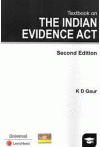- Author(s): K.D. Gaur
- Publisher: Universal LexisNexis
- Edition: 2 Ed 2020
- ISBN 13 9789389991017
- Approx. Pages 383 + Contents
- Format Paperback
- Delivery Time 3-5 working days (within Kerala & South India) (Others 7-9 days)
............................................................................................................................
Description
After having written extensively on the substantive and procedural Criminal Law - the Indian Penal Code, 1860 and the Code of Criminal Procedure, 1973, I thought I would be failing in my duty, if I do not write an authoritative book on law of Evidence. With this object in view, I have endeavoured to write this book so that long felt need of students, teachers, members of the Bench and Bar, prosecutors, defense, police personnel, NGO's, and those interested in the administration of justice be met. The importance of an exhaustive and standard text book on Law of Evidence can be visualized from the very fact that Law of Evidence is applicable to both civil and criminal cases including local and special Acts. Colonial rulers - The British - after having enacted the Indian Penal Code in 1860 and Civil Procedure Code as well Criminal Procedure Code enacted Law of Evidence in 1872. It extends to the whole of India, except the State of Jammu and Kashmir (excluded vide Article 370 of the Constitution) and came into force on the 1st day of September 1872 after the Evidence Bill having been by the then British legislature on 15th March 1872. The Act originally consisted of 167 sections when enacted. However, in the course of time a number of new sections have been inserted in order to accommodate and adjust with the changing needs of the society. But to keep the pattern of the Act intact additional sections have been inserted by affixing Roman letters A and B, making total sections 181; new sections are 22A, 45A, 47A,53A, 65A, 65B, 67A, 73A, 113A and 113B.
............................................................................................................................
Contents
PART I RELEVANCY OF FACTS
Chapter 01: Preliminary
Chapter 02: Of The Relevancy of Facts
PART II ON PROOF
Chapter 03: Facts Which Need Not Be Proved
Chapter 04: Of Oral Evidence
Chapter 05: Of Documentary Evidence
Chapter 06: of the Exclusion of Oral By Documentary Evidence
PART III PRODUCTION AND EFFECT OF EVIDENCE
Chapter 07: Of the Burden Of Proof
Chapter 08: Estoppel
Chapter 09: Of Witnesses
Chapter 10: Of the Examination of Witnesses
Chapter 11: Of Improper Admission and Rejection of Evidence
Subject Index
............................................................................................................................
Author Details
Professor K D Gaur, former Vice-Chancellor, Professor and Head, Post-Graduate Department of Law, Utkal University, Bhubaneshwar,
presently Professor Emeritus, New Law College, Bharati Vidyapeeth University, Pune, former Director Research (Law) and Founder Director, Amity Law School, Lucknow, is a distinguished scholar and jurist of international repute. Professor Gaur has had an outstanding career with an LL.M. (Gold Medal) from Allahabad University and Ph.D and LL.D. from the University of London. He has worked at the Indian Law Institute, the law faculties of Meerut, Rajasthan, Utkal and Benaras Hindu Universities in India; Visiting Fellow, Institute of Advanced Legal Studies, University of London; Fulbright Visiting Professor, United States; Visiting Professor, Max Planck Institute for Foreign and International Private Law, Hamburg and Max Planck Institute for Foreign and International Criminal Law, Freiburg, Germany; Visiting Professor, U.S.S.R. National Academy of Science, Moscow; Visiting Professor, University of Malaya, Kuala Lumpur and International University of Malaysia; University of Pondicherry; U.G.C. Emeritus and Visiting Professor, University of Lucknow and Director, Vivekanand Institute of Professional Studies, GGSIP University, Delhi, etc.
............................................................................................................................

